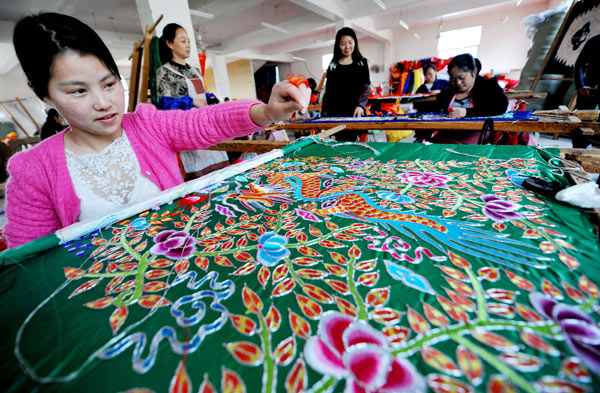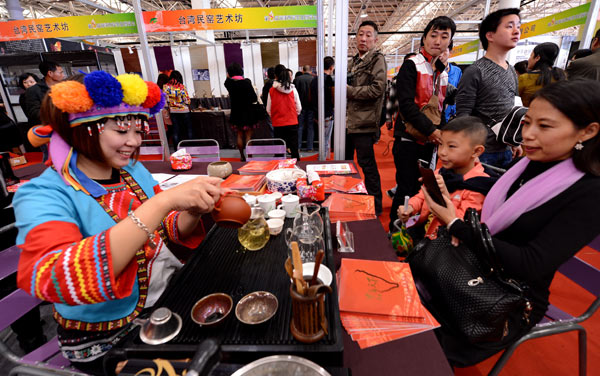 |
|
Lyu Yajun works on an embroidery product to be shipped to Taiwan in Fenglingtou, a township in Shangrao county, Jiangxi province, in March. ZHUO ZHONGWEI/ FOR CHINA DAILY |
As Taiwan's new leader prepares for her inauguration, business people look for relations with the mainland to remain on an even keel
Editor's note: China Daily is publishing a series of reports on cross-Straits relations ahead of the inauguration of Taiwan's new leader. The reports are jointly compiled with the Taipei-based China Post. The first, by China Daily reporters An Baijie and Hu Meidong and China Post reporter John Liu, looks at how business people are viewing the joint ties.
As Friday, inauguration day for Taiwan's new leader, approaches, businesspeople across the Straits are concerned about uncertainties brought by the political change in Taiwan.
They have urged the new government, led by Democratic Progressive Party politician Tsai Ing-wen, not to destroy the good basis for peaceful development built up over past years.
They also say that people on both sides of the Straits should not suffer from political confrontation between the Chinese mainland and Taiwan.
Taiwan investor Nien Shun-jung said he is confident about his business on the mainland even though Tsai's inauguration could bring uncertainties to cross-Straits relations.
Nien, 38, CEO of Crown Wei Pingtan Trading Co, runs a gift shop named Taiwan Gege at the Aoqian township duty free market in Pingtan, Fujian province, the closest place on the mainland to Taiwan. The shop opened three months ago and all goods sold there are imported from Taiwan and are exempt from customs duty.
"I don't care who Taiwan's ruling political party is because it's none of my business. No matter who the top leader of Taiwan is, he or she will not turn a blind eye to the mainland's huge market," he said.
"The mainland's supportive policies have made Pingtan an ideal place for Taiwan's ambitious younger people and experienced middle-aged businesspeople like me to look to for our future," he said.
 |
|
An exhibitor from Taiwan makes tea for visitors during a cross-Straits expo in Wuyishan, Fujian province. Zhang Guojun / Xinhua |
Last year, cross-Straits trade volume reached $188.56 billion, and about 40 percent of tourists visiting Taiwan came from the mainland, which is also the island's largest investment source and its prime export destination.
Reflecting the advanced development in exchanges across the Straits, nearly 100,000 Taiwan companies have set up operations on the mainland, while last year alone, 9 million people traveled across the Straits in various capacities.
Tsai is replacing Ma Ying-jeou, from the mainland-friendly Kuomintang, as Taiwan's top leader. She has said that once she takes office, she will expand the island's export markets to Southeast Asia and attract more tourists from countries in that region.
But mainland-based Taiwan businesspeople say the challenge lies in the fact that change won't happen that soon.
Steve Lai, executive director of the Supply Management Institute in Taiwan, said: "From what we've heard ... transformation can't happen that quickly. Until major changes to the island's export trends occur, Taiwan dearly needs the mainland market."
With observers waiting to hear Tsai's comments on cross-Straits relations in her inauguration speech, Taiwan businesspeople said her main challenge is to find the "political language" that can please Beijing.
Beijing has called repeatedly for Taipei to continue peaceful development of cross-Straits relations, adding that it must accept the 1992 Consensus — that the mainland and Taiwan belong to "one China".
On May 5, People's Daily said in an editorial that if Tsai refuses to accept the 1992 Consensus, this will be considered an act that jeopardizes cross-Straits relations. The editorial, which set an unprecedentedly serious tone, has been viewed as a warning from Beijing toward Taiwan's new government.
During the annual session of China's top legislature in March, President Xi Jinping told lawmakers that the mainland's policy toward Taiwan is clear and consistent, and it will not change with Taiwan's political situation.
Ni Yongjie, deputy director of Shanghai's Taiwan Research Institute, said the mainland has sent a strong signal to Taiwan authorities that accepting the 1992 Consensus is the premise for further developing cross-Straits relations.
Zhang Zhijun, head of the State Council's Taiwan Affairs Office, said in March that cross-Straits relations could be affected by unknown factors. He urged Tsai to clarify her understanding of these ties.
But observers said that Tsai and the DPP appear to prefer political ambiguity in an attempt to maintain the status quo in cross-Straits ties.
Lai said, "From what I understand, Beijing doesn't allow such ambiguity." As a result, cross-Straits relations are now "stuck'' and it will take great wisdom from both sides to resolve the issue. If not, there are likely to be consequences for the economies on both sides of the Straits, and "this may be particularly hurtful to Taiwan," Lai said.
There are measures Beijing can take to punish Taiwan — for example, by squeezing the flow of mainland tourists to the island, he said.
Hopefully, both governments won't jeopardize the momentum built up over the years and will adopt pragmatic approaches that benefit both economies, he said.
Tension may hurt Taiwan
Justin Mo, 25, who owns the Sanyou Duty Free Shop in Pingtan, said Beijing and Taipei should not quarrel or fight, as business development needs a stable environment.
Taiwan's political parties should not play cross-Straits relations "as a card" to cater to a small group of people, as this could harm the island's economy, he said.
Ho Hsi-hao, chairman of the Taiwan Business Association in Zhangzhou, Fujian, said Tsai has promised to maintain the status quo.
"We hope that she won't worsen cross-Straits relations, as this will not be in Taiwan's interests," Ho said.
Although Tsai won the election in January, her support came mainly from her core constituency. If she keeps cross-Straits relations on good terms, Taiwan merchants will support her re-election. If not, "we will be forced to go back and oppose her", Ho said.
Asked how Taiwan businesses on the mainland may be jeopardized by any tension that arises after Tsai takes office, Ho said the impact will be limited.
Taiwan and its residents will bear the brunt of any tension, he said, citing the recent decline in mainland tourists visiting the island as an example. "The mainland is still an important market," he added.
Chiang Pin-kung, former chairman of the Taipei-based Straits Exchange Foundation, advised the new government to maintain social harmony for both sides. It should sign the cross-Straits pact on trade in goods as soon as possible, he added.
Nien, the Taiwan businessman who worked on the mainland from 1999 to 2010, said there might be uncertainties arising from the island's political transition, but the direction of peaceful development will not be changed.
He has moved his family — including his son who is in primary school and his daughter who is in kindergarten — from Kaohsiung in Taiwan to Pingtan. Nien believes it is the right choice for his family to invest and live on the mainland.
"I have made up my mind to strive for my future on the mainland for at least another 10 years," he said.
Yang Jie in Fuzhou contributed to this story.
